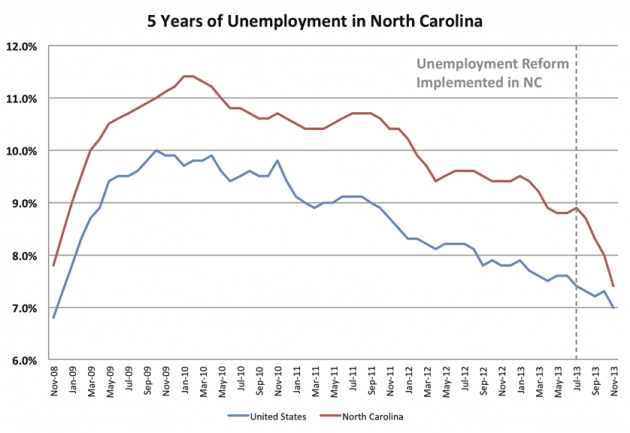Publisher's note: This post, by Brian Balfour, was published in the Economy section(s) of Civitas's online edition.
This article originally appeared in the Raleigh News & Observer
"You get what you pay for" goes one popular old adage. And in North Carolina, it appears that we had for some time been paying to secure one of the highest unemployment rates in the nation. But lo and behold, when you stop paying people not to work, more people actually go back to work.
That's the lesson North Carolinians will hopefully learn from the good news that the Tar Heel state's unemployment rate has fallen even further, dropping to 7.4 percent according to the latest figures.
Most of you will recall that the state legislature, in an attempt to responsibly pay back roughly $2.5 billion borrowed from the federal government to cover unemployment benefits, reformed the state's unemployment insurance program last year. One result from the reforms was that federally-funded extended unemployment benefits were discontinued; basically shortening the duration of time the unemployed could collect benefits back to pre-recession length.
This last measure became effective July 1, and became a major bone of contention for last summer's "Moral Monday" protests.
"They are literally hurting people, and it is wrong," said Rev. William J. Barber II, president of the North Carolina chapter of the N.A.A.C.P, of the shortened unemployment benefit duration. "It's about violating people's deepest moral values."
We'll leave for another article a discussion of what moral code Rev. Barber subscribes to that prefers the use of government force to compel the transfer of benefits, instead of fostering voluntary charity inspired by individual conscience.
Rather, let's examine North Carolina's labor picture since the summer's controversial unemployment changes.
In July, North Carolina's unemployment rate stood at 8.9 percent, a dismal fifth highest in the nation and a full 1.5 percentage points above the national average of 7.4. Since then, the state's unemployment rate dropped remarkably, down to 7.4 percent, improving to 14th highest in the nation. The 7.4 rate is less than one half of one percentage point above the national average of 7 percent.
Indeed, North Carolina's unemployment rate has dropped by 2 full percentage points over the past year, the largest such drop of any state, with three quarters of that decline coming since the unemployment changes.
Critics may see these figures and claim the unemployment rate is dropping more sharply since the end of extended unemployment benefits only because more people are giving up looking for work, retiring or returning to school, thus dropping from the labor force.
According to a report analyzing North Carolina's labor market produced by Wells Fargo economists, however, the monthly rate of those dropping out of our state's labor force has actually slowed since the summer. So much for that theory.
Moreover, North Carolina added nearly 40,000 jobs in the three months ending in November. By contrast, the state had lost more than 45,000 jobs in the first 8 months of 2013.
The trend lines are clear: North Carolina's jobs picture has drastically improved since the extended unemployment benefits were cut off this summer. Apparently, more people being gainfully employed goes against Rev. Barber's "moral values."
Granted, the elimination of the extended unemployment benefits cannot entirely explain the positive jobs trend here. But the idea that more people being paid to work versus being paid not to work is better for the economy should be so patently obvious only the most ideologically blinded zealots would try to deny it.
Even the New York Times resident left-wing economist Paul Krugman acknowledges that extended unemployment benefits will likewise extend higher levels of unemployment. In his 2010 economics textbook, Krugman stated "Public policy designed to help workers who lose their jobs can lead to structural unemployment as an unintended side effect." He explains that granting more generous benefits "reduces a worker's incentive to quickly find a new job. Generous unemployment benefits in some European countries are widely believed to be one of the main causes of 'Eurosclerosis,' the persistent high unemployment that affects a number of European countries."
Congress is currently debating whether to reinstate extended unemployment benefits once again - they were allowed to lapse just after Christmas - including benefits for out of work Tar Heels. If that passes, State lawmakers will have the option to accept or deny the federal extension.
If they do accept, the results will be predictable: paying more people not to work will result in more people not working. Unemployment will be higher than otherwise, the economy's output will fall (slowing economic growth), and actual job opportunities will dry up.
After all, you get what you pay for.

























